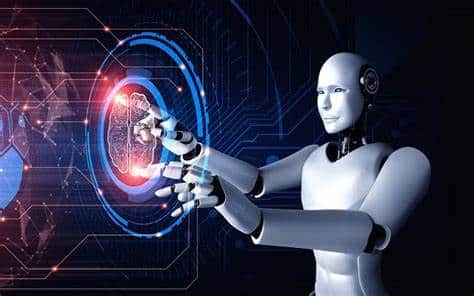Table of Contents
When Artificial Intelligence Takes Over
Artificial intelligence (AI) emerges as a world revolution in employment. It arises in the midst of fast technological developments. Major tech companies in Silicon Valley play a key role in worldwide logistics chains. It does not just change various industry verticals; it changes them entirely. The evidence is clear and haunting. Each quarter brings tens of thousands of direct layoffs due to AI intervention.
Even small businesses use artificial intelligence to gain an upper hand and improve productivity. This shift towards AI-backed business processes marks a major transition. It has implications for how we traditionally define jobs and workforces. The big question remains: Does this transition imply the end of traditional job roles? Or, it heralds a new era with huge opportunities. It also offers different paths for professional growth.
How Tech Industry Can Ride Through the Wave of Induced Layoffs
This paper aims at examining the current wave that has hit technology firms, causing layoffs, focusing on AI’s role in this trend. We want to go beyond just narrating these changes and also talk about what it means for AI to supplant all else in workplaces. People are feeling anxious about where they will find work going forward with automation and smart systems relentlessly progressing. The question becomes how can workers redefine their careers amidst disruptions caused by artificial intelligence? Is there room for growth provided by artificial intelligence?
The bright side – discovering new horizons in a world conquered by AI.
As we venture more into consequences emerging out of fast development of AI, it is important to note that this technological revolution has two sides. Although many may feel threatened initially through job losses, there is an underlying atmosphere optimism. The revolution brought about by Google’s DeepMind et al does not merely mean loss of certain jobs but even fundamentally creates new categories and industries. The purpose of this article is to contribute towards this understanding by examining how employees can survive and flourish within the AI dominated environment. The following sections look at the intricate dynamics of this transition, exploring the hurdles as well as opportunities that lie ahead in a future filled with AI.
Dynamic Shifts in the Tech Industry: A Time of AI-Driven Changes
Layoffs as a Signal for Change
The technology sector is currently going through a period of serious transformation, which has been displayed recently by numerous layoffs among its giants. It may be noted that famous companies like DocuSign, Snap, Okta, Zoom, Google and Amazon are parts of this process. This year alone saw over 50k employees being laid off from these tech moguls.
This emerging trend underscores a strategic move towards the integration of artificial intelligence (AI) technologies and cost cutting strategies to remain competitive in an increasingly cutthroat industry.
In-depth Understanding about Company-wide Realignments
- DocuSign’s Strategic Reevaluation: In efforts to cut operating costs and raise stock market value, the firm said it would lay off 6% of its employees or 400 people.
- Snap’s Operational Restructuring: The parent company for Snapchat – Snap Inc. – has decided to sack 10% of its staff. This action is aimed at redistributing resources so as to prompt growth given the daunting revenue forecast.
- Okta and Zoom’s Efficiency Measures: A total number of approximately 400 people from Okta’ s workforce would lose their jobs while the number runs into hundreds in case of Zoom. These measures are intended to enhance their operations efficiency thus re-channeling investments into more lucrative domains primarily focused on AI.
- Major Cuts at Google and Amazon: Alphabet (Google’s parent company), Amazon too are not left out by the changing dynamics in technology industry, with Alphabet announcing that it will shed off around 12 thousand workers and Amazon also making large scale retrenchments especially in its pharmacy unit; all intended to realign company resources towards AI among other strategic goals.
Wider Significance Of Tech Industry Layoffs
The most recent wave of dismissals indicate a fundamental change in the attitude towards operation in the tech sector. After a time of quick growth and wanton hiring, the emphasis moved on to efforts aimed at improving operational efficiency, increase profitability and strategic investment in AI. This is not only about saving money; instead, it’s a complete rethinking of how the tech firms see their future potential for growth rooted in AI.
While AI becomes increasingly central to defining corporate strategies as well as dictating the direction in which the industry should go, this new chapter for the tech sector. The era that follows will be remembered as one where artificial intelligence is at the core of innovation and competitive advantage in the industry but it is a transformational phase that marks a new beginning for technology-based businesses.
Ripple Effects Generated By AI on Global Markets
The Spreading Tentacles of Artificial Intelligence
It’s not just the tech industry that is impacted by artificial intelligence (AI) but also many job markets and a complete shift in how businesses are run in different industries.
A Case Study on UPS: Efficiency is Key Driven by AI.
This can be seen at UPS, a leading global delivery and logistics company, which serves as a prime example of how far-reaching AI can be. Here, AI has driven significant improvements in operations. Through automation and advanced pricing algorithms, UPS has greatly improved its delivery capabilities. These innovations by AI have minimized fuel consumption while accelerating package deliveries, and allowed dynamic pricing models that take into account factors such as parcel size or delivery urgency to optimize profits for customer satisfaction.
Workforce Transformation through AI
The utilization of AI in areas like logistics highlights the dual nature of technological advancement. It undoubtedly leads to operational efficiencies as well as creating opportunities for innovativeness but also necessitates a review of labor dynamics.
For instance by eliminating approximately 12k jobs predominantly in administrative & operational departments such roles will change towards more supervisory & management positions over seeing Ai systems rather than traditional labor-intensive jobs.
The Ramifications of Faster AI Adoption
The pandemic has triggered rapid integration of this technology in different sectors. This accelerated adoption enabled companies to easily switch to online platforms, follow changing customers’ habits and make their supply chains stronger. This dramatic transformation has implications for hiring practices and job security that heralds an era of digital transformation and workforce realignment.
Navigating the AI Revolution: A Pathway to New Opportunities
Exploring the Silver Lining of AI Expansion
But as AI runs through different industries, it does not only take jobs away. We should note that there are opportunities for growth and breakthroughs which are generated by its widespread proliferation.
Beyond tech industry borders it has infiltrated consumer products, manufacturing etc. This has changed the way products are made, supply chains managed and how businesses relate with customers.
Fresh Skills Required
These new environments require skilled people in different areas. There is growing demand for professionals who can analyze data properly manage digital infrastructures and program AIs among others. Having these abilities is instrumental in promoting innovation and gaining competitive advantage in the present business environment.
Moreover, the rise of AI emphasizes that HR still plays a critical role in technology recruitment. As companies scramble to meet rising demand for digital skills, HR experts who specialize in hiring technology talent have become essential human resources assets.
These HR experts are key to detecting and acquiring employees capable of working with AI intricacies and harnessing these technological developments to further organizational objectives. The capability of attracting or retaining such pivotal roles has grown into a strategic imperative for firms across diverse arenas thus making HR expertise more important than ever before.
Wider Impacts on Jobs because of AI
This is not actually about filling positions with AI experts within expanding sectors led by AI. It’s about generating entirely new job classifications. In health care, for instance, artificial intelligence is changing patient treatment as well as diagnostics while finance utilizes AI in fraud detection and provision of personalized banking services.
These fields need not only persons who love everything about anything but those who can combine what they know about industry practice with a strong technical background so as to foster innovation synergistically speaking.
The Future Job Market in the AI Era
In sum, more mature markets characterized by pervasive application of automation across disparate sectors exemplify an intimate interface between technological displacement and job creation. Consequently, a future whereby flexibility, teachability and blending of tech knowhow with exclusive industry information will be core to career progression seems inevitable.
Thus, the manifestation of AI’s potential across different industries is indicative of a changing phase in employment that is now being characterized by another wave of jobs as seen from the perspective of technological prowess fused with industry-specific understanding.
Embracing the AI Revolution: Challenges and Opportunities
AI’s Unstoppable March Across Industries
Silicon valley has experienced a significant transformation, which is more than just technological. It has fundamentally reshaped the labour market across all sectors. This technology has spread to different sectors, causing high unemployment. Many tech industry workers have been laid off. However, experts anticipate that this same revolution will generate numerous opportunities for growth and innovation across various domains.
The business world demands that employers boost their operational efficiency and bottom line through application of AI for instance. This need also extends to other departments that are not directly linked to IT. However, they still require personnel with knowledge about computer software.
The Dual Nature of AI’s Economic Impact
The shift towards an AI-dominated economy has resulted in a job market that now values adaptability, continuous learning, and strategic use of technology tools more than ever before. Incorporating artificial intelligence into work processes poses difficulties and challenges. It may lead to job loss due to automation, but also creates a platform for innovation.
However, it is important to note that it has two sides. One side involves dislocation, while the other presents opportunity. It indicates how professionals will start working together with machines. They will do this to achieve higher productivity levels.
In summary, AI dominates modern industries. It’s both a dystopian narrative and an attractive future possibility. This indicates technological advancements, coupled with human ingenuity, could change work sites enormously.



